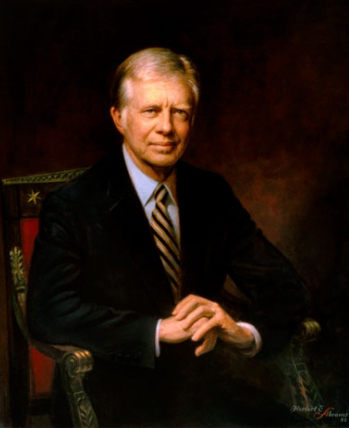
President Jimmy Carter Biography
Jimmy Carter was the 39th president and was elected in 1976 after serving as governor of Georgia. During his time in office he championed many of the environmental standards that are now commonplace. After leaving office Carter has dedicated his life to public service.
Carter began his career of public service by joining the Naval Academy in 1943. After graduating in 1946, he would go on to be deployed across the world. He would go on to become a key part of the United States nuclear submarine program. During his time with the program, Carter assisted with the clean up for a partial nuclear meltdown. In 1953 he would be honorably discharged with the rank of lieutenant and serve in the naval reserves until 1961.
After leaving the Navy, Carter would take over his father’s peanut farm in Georgia. After a rough start, he would expand his farm into a very successful business. He would use his prominence as a farmer to run a successful state senate campaign in 1962. This would lead him to run for governor in 1966. While he would lose the election in 1966, he would run once again in 1970 and win.
As governor, Carter would work to end racial segregation and help the disadvantaged. His middle of the road style helped him appeal to both Democrats and Republicans. This lead him to be in the position to appoint many African American judges and other state officials. Even though he was in his first term as governor, Carter was starting to eye national politics. That became evident as he began to work with the Democrat National Committee.
When Carter entered the race in early 1976 he was seen as a long shot candidate. With early wins in the primary states of Iowa and New Hampshire, Carter quickly became the frontrunner for the nomination. His appeal to conservative and rural voters helped him become popular choice in both the north and south. Since he entered the race as a relatively unknown national politician, he was viewed as an outsider. This turned out to be a good thing since the country has just went through the Watergate scandal.
In the general election Carter would face President Gerald Ford, who had taken over when Richard Nixon had resigned. The race would end up being a close one, but Carter would win the electoral college vote 297-240. He would also win the popular vote by two percentage points, 50.1% to 48%. The outsider vision he presented, along with his southern Christian values, helped Carter appeal to those that wanted a change to the tone in Washington.
As President, Carter looked to guide the country through rough times. On his first day in office, as an attempt to heal the country, Carter would sign an executive order granting amnesty to though who dodged the draft during the vietnam era. His first year in office would be marred by an energy crisis and the onset of inflation. In response to those issues, he would lead by example with the installation of solar panels at the Whitehouse.
As his first term continued, Carter faced more and more difficulties, both foreign and domestic. Russian aggression in Afghanistan, the continued energy crisis and the Iran Hostage Crisis all lead roadblocks for the Carter administration. Going into the election year it would be the Iran Hostage Crisis that would play a major part in the election results.
In the 1980 general election Carter would face former California Governor Ronald Reagan. Much like Carter did in 1976, Reagan was running as a Washington outsider. As the Iran Hostage Crisis continued, approval of Carter started to dip. In what many thought would be a close re-election for Carter, would end up as a landslide victory for Reagan on November 4, 1980.
After his time as president, Carter would take on many humanitarian efforts. He would become greatly involved in Habitat for Humanity in 1984, which helped him rebuild his image after losing in 1980. He would go on to promote peace and help provide resources to poor nations, all leading up to him receiving the Nobel Peace Prize in 2002. To this day he remains involved in many causes and has published many books.
Time in Office (1977-1981)
Born: October 1, 1924 Died: December 29, 2024
Wife: Rosalynn Smith
Party: Democrat
Vice President: Walter Mondale
Religion: Baptist
Reference Links
Jimmy Carter presidential library
Jimmy Carter on Whitehouse.gov
A Detailed Timeline of Jimmy Carter’s Presidency